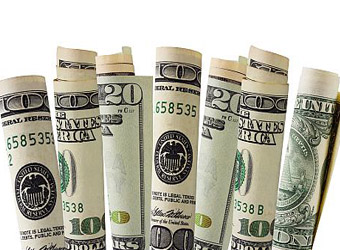In stark contrast to the United States, benign inflation data in the euro zone dented expectations that the European Central Bank will dial back its stimulus, slamming the euro to five-week lows against the dollar and a six-month nadir against the yen.
The dollar index rose to five-week high of 90.746, as Powell’s optimism on the U.S. economy suggested the Fed is going to raise interest rates four times this year, one more than what markets had expected.
That undermined risk appetite and hit equities, which in turn kept the U.S. currency on the defensive against the yen, seen as a safe haven because of Japan’s status as a net creditor nation.
Some also pointed out that support for the dollar from higher interest rates – the main driver of its gains until early 2017- has been tenuous in the past year, as investors’ focus is shifting to Washington’s currency policy and the twin U.S. trade and fiscal deficits.
Euro zone inflation slowed to a 14-month low in February, data showed on Wednesday, underscoring why the European Central Bank remained cautious about removing stimulus despite growth exceeding expectations.
Inflation in the 19 countries sharing the euro slowed to 1.2 percent from 1.3 percent in January, in line with expectations but far from the ECB’s long elusive target of almost 2 percent.
A closely watched measure of underlying inflation which excludes volatile energy and unprocessed food prices held steady at 1.2 percent.
“Markets are pricing in the chance that the ECB will raise interest rates as early as by the end of this year, so a return of a scenario of another extension in its bond buying and pushing back rate hike into 2019 could put pressure on the euro,” Makoto Noji, senior strategist at Nikko SMBC said in report.
The euro was also hurt by political uncertainties as Italians are preparing to vote in a national election on Sunday, while the leading political parties in Germany decide on a coalition deal that would secure Angela Merkel a fourth term as chancellor.
The British pound was pressured by renewed worries over Brexit after the EU’s chief Brexit negotiator said a transition deal was not guaranteed while the prime minister said the EU’s draft legal text would undermine Britain.
The pound fell to $1.3746, its lowest level since mid-January. The euro firmed to 0.88625 pound, having risen almost 1 percent from this week’s low of 0.8772 touched on Monday.
Besides the safety-bids, the yen also got a boost from the previous day’s Bank of Japan bond-buying operations, where the central bank trimmed the amount of its buying in super-long Japanese government bonds.
The dollar slipped to 106.635 yen, turning lower on the week after its 0.6 percent fall on Wednesday.
Elsewhere, the Canadian dollar also eased to 10-week low of C$1.2845 per U.S. dollar.
Source: Reuters

